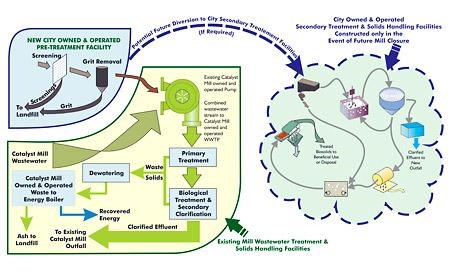Catalyst Paper Corporation has committed to reducing the cost of treating the City of Powell River’s liquid waste.
Brian Baarda, Catalyst’s vice president, finance, and chief financial officer, wrote a letter to mayor and council dated May 5 about the annual payment. “Catalyst hereby commits to reducing the annual payment for joint treatment of City of Powell River sewage from the original $750,000 amount in the agreement in principle to an annual all-inclusive payment of $500,000,” the letter stated. Joint treatment is one option being considered in the city’s liquid waste management plan (LWMP).
City council passed a motion at its May 5 meeting to accept Catalyst’s offer. Councillor Jim Palm said the letter was an important development in terms of moving ahead with joint treatment. “It directly affects the cost of going in that direction,” he said.
Council passed three resolutions at the council meeting, all of which were referred from the LWMP steering committee meeting held that morning.
The first motion was to enter into negotiations with PRSC Limited Partnership to acquire an option to purchase property around the Townsite wastewater treatment facility. The city is eyeing about six hectares (14 acres).
The third motion was to locate the pre-treatment works, needed for joint treatment, at the Townsite facility as an option. Pre-treatment removes coarse solids and grit from wastewater and the facility would be used in a consolidated plant as well as joint treatment.
Dave Douglas, director of financial services, said the location of the pre-treatment works would be the eventual site of a treatment plant, if the mill closes. “That means, what you’re doing in pre-treatment is laying up your first building and you’re pumping it up to the mill site,” he said. “If the mill closes, you’re adding your second building, which is secondary treatment.”
Also during the steering committee meeting, Marie Claxton, city clerk, read out a letter from the UBCM (Union of BC Municipalities) informing the city its application for Innovations Funds for joint treatment was not approved for early funding. However, its application will be considered during the second round of approvals. UBCM expects to make funding decisions by late summer or early fall 2011.
At the joint local-technical advisory committee meeting held on Tuesday, May 3, Sarah Barkowski, a member of the committee and Catalyst’s environment manager in Powell River, reported on developments regarding the company’s effluent permit. Before joint treatment can occur, the provincial ministry of environment (MOE) would have to approve an amendment to Catalyst’s permit. Barkowski reported on a conference call that included MOE, who said it was premature to start the amendment process. “They will not amend our permit until the city has an approved LWMP,” Barkowski said. “They asked us to hold off.”
Up until the conference call, the plan had been for Catalyst and the city to work in parallel on their respective processes.
As well, the city’s engineering consultants, Dayton and Knight, and Catalyst representatives are exploring the possibility of using the company’s existing primary clarifier to store the city’s sewage during maintenance shut downs at the mill. The clarifier could hold only a limited amount of the city’s wastewater during these events and eventually it would have to be discharged into Malaspina Strait. MOE would have to approve this scenario.



